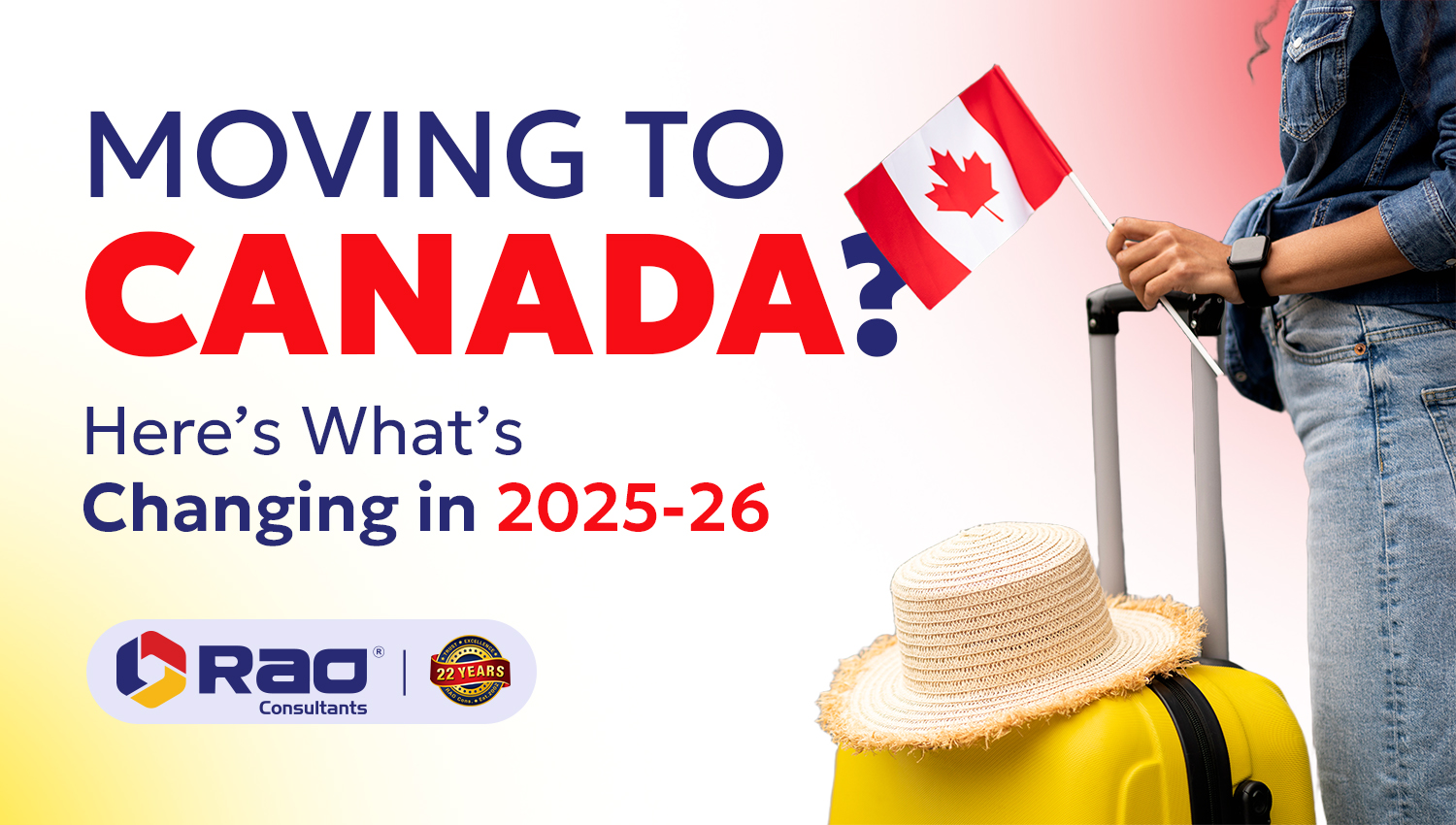
Rao Consultants
March 25, 2025
Moving to Canada? Here’s What’s Changing in 2025-26
![]()
Canada has always been a popular immigration destination because of its robust economy, top-notch educational system, high standard of life and multiple immigration pathways. Due to some recent commotion there has been a negative air around moving to Canada. But, as 2025–2026 approaches, a number of immigration reforms are expected to change the environment and bring positive winds for families, skilled workers, and students wanting to make Canada their home. There and many recent laws and initiatives that are being taken by the Canadian government, which is again making Canada an even wiser choice, regardless of your goals—a secure future, greater employment possibilities, or high-quality education.
This blog covers all of the most recent immigration reforms, their impacts, and why now is the best time to consider relocating to Canada. Read till the end to know how these changes are going to affect the future of immigration in Canada and how it is going to benefit Indian Immigrants.
Key Immigration Updates
The following are the recent updates made by the Canadian Government that sheds a positive light towards their vision to welcome Immigrants to their country.
1. Easier Immigration Policies: A More Open Canada
Canada has proposed policy adjustments to attract more qualified workers and students while preserving a balanced immigration system. The Canadian government’s aim behind implementing these policies is to expediate the visa processing time clearing out the backlogs and extending avenues to Canada PR.
Why are these changes being made?
The reason these changes are being made, and these laws are being made more accessible by the Canadian government is to address the labour shortage in many of the provenience and to tackle the problem of economic development. Businesses benefit from these changes, which also provide economic stability and guarantee Canada’s competitiveness in the global market.
Practical Impact:
- Faster PR clearances for competent staff, resulting in drastically shorter wait times.
- Easy access to work permits for overseas students, making Canada a more appealing study location.
- Increased work chances for immigrants, particularly in high-demand fields such as technology, healthcare, and education.
2. New Leadership, New Opportunities
Under the leadership of Minister Marc Miller, Immigration, Refugees and Citizenship Canada (IRCC) is implementing a new immigration policy for Canada. When the leadership of the immigration system changes, new regulations are usually implemented with the goal of enhancing its efficacy and transparency.
Key Changes Under New Leadership:
- A higher emphasis on economic immigration to overcome labour shortages.
- Improved assistance for international students, including faster application processes and enhanced post-study employment opportunities.
- A more open and predictable visa processing procedure, resulting in speedier approvals and less delays.
For prospective immigrants, these changes mean a smoother and more accessible pathway to settling in Canada.
3. Increased Minimum Wage (April 1st, 2025)
The federal minimum wage in Canada will increase significantly to CAD 17.75 per hour on April 1, 2025, with the goal of enhancing financial security for workers, especially temporary workers and students.
Why does this matter?
Better financial stability is ensured by a greater minimum salary, which makes it simpler for foreign workers and students to pay for living expenditures like food, housing, and transportation. It also demonstrates Canada’s dedication to paying workers fairly and improving their standard of living.
How This Benefits You:
- Increased financial freedom for students and temporary workers.
- Living expenditures can be more easily managed in big cities such as Toronto and Vancouver.
- Higher salaries improve the economy by increasing consumer expenditure.
4. Extended Post-Graduation Work Permit (PGWP)
Immigration, Refugees, and Citizenship Canada (IRCC) has made a major policy change by eliminating the field-of-study criteria for foreign college graduates seeking the Post-Graduation Work Permit (PGWP). With effect from March 2025, this modification makes PGWPs available to graduates of any college bachelor’s degree, regardless of their subject of study.
How does this help students?
- The removal of field-of-study limitations allows overseas students to enrol in a wider range of programs because they will still be eligible for the PGWP once they graduate.
- The PGWP permits overseas graduates to work in Canada for up to three years, offering adequate time to gather relevant Canadian work experience, which is vital for permanent residency applications.
- International students can become more financially independent by working full-time after graduation, which can help with living expenses and student debt payments.
This extension is a game-changer, ensuring that international graduates have enough time to build a strong foundation for their future in Canada.
5. Express Entry Boost for Educators
Canada has added a specific category for education professionals to its Express Entry system in an effort to meet the rising demand for certified teachers. Immigration, Refugees and Citizenship Canada (IRCC) announced the project on February 27, 2025, with the goal of recruiting qualified educators and education professionals to fill important positions around the nation.
Benefits for Teachers:
- Faster PR processing using Express Entry’s category-based drawings.
- Candidates with relevant expertise in elementary, secondary, and special education have a better chance of being selected.
- Job stability in an industry that continuously requires experienced workers.
Eligible NOC Codes:
- 41220: Secondary school teachers.
- 41221: Elementary school teachers.
- 42202: Early childhood educators.
For those in the education sector, this update makes Canada an even more attractive destination.
6. Home Care Worker Pilot Extension
Canada plans to introduce the new Home Care Worker Immigration Pilots on March 31, 2025, providing a simplified path to permanent residency (PR) for careers and home support professionals. These pilots will replace prior initiatives and attempt to meet the growing need for home care services due to Canada’s ageing population.
Key Highlights:
- Qualified home care professionals can receive PR upon arrival without prior Canadian work experience, making the immigration process easier.
- The pilots lower language requirements to a Canadian Language Benchmark (CLB) level 4 and simply demand a high school education, making the program more accessible to candidates.
- Applicants can receive employment offers from a wide range of companies, including private families and organisations that provide home care services, allowing for a diversified work environment.
With an increasing need for healthcare and elderly care services, this extension ensures that caregivers have a stable future in Canada.
7. Parents and Grandparents Program (PGP)
The Parents and Grandparents Programme (PGP), which enables Canadian citizens and permanent residents to sponsor their parents and grandparents for permanent residency, is a prime example of Canada’s dedication to family reunion. Up to 10,000 sponsorship applications will be accepted under this initiative by Immigration, Refugees and Citizenship Canada (IRCC) in 2025.
Why is this important?
- Improves family reunification, allowing more families to live together.
- Allows elderly parents and grandparents to receive Canada’s healthcare and social services.
- Provides long-term family stability and emotional assistance to incoming immigrants.
Eligible sponsors can submit an expression of interest and receive invitations based on a randomized selection process.
8. Provincial Nominee Program (PNP) Updates
Canada’s Provincial Nominee Programs (PNPs) were significantly updated in 2025, providing more chances for qualified people to gain permanent residency (PR) that are tailored to regional labour market requirements.
How PNPs Benefit Immigrants:
- PNPs sometimes provide faster paths to PR for experts in high-demand sectors, alleviating acute labour shortages.
- Provinces change their nomination allotment to meet urgent employment openings, increasing chances for competent workers.
- PNPs assist individuals who do not fit federal Express Entry standards but have work offers or experience in specialised occupations, therefore simplifying their immigration process.
If you’re looking to immigrate to a specific province, PNPs offer a tailored approach to securing PR.
9. Tech and Healthcare Sector Growth: Future-Proof Careers
Professionals looking for steady and fulfilling professions have a lot of options because to Canada’s strategic focus on the technology and healthcare industries. The nation’s immigration policies are increasingly focused on attracting talent in these critical areas due to their critical importance in fostering economic growth and ensuring the welfare of the population.
Opportunities in the Tech Sector:
- There is a great need for cybersecurity experts, AI specialists, and software engineers.
- Immigration pathways like the Global Talent Stream that are specifically designed for the IT sector.
- Investment in the innovative hubs of large cities.
Opportunities in the Healthcare Sector:
- There is an immediate need for nurses, doctors, and medical technicians.
- Faster PR procedures for healthcare professionals.
- Government funding for public health services should be increased.
For professionals in these sectors, Canada offers immense growth potential and career security.
Conclusion
Canada continues to improve itself as a top immigration destination by progressive laws that improve possibilities for students and professionals. Individuals may establish a future in Canada thanks to greater pay, extended work permits, and specific immigration channels.
If you’re thinking about moving, staying up to speed on the latest developments will help you prepare more effectively. The time to act is now—look into your alternatives, speak with immigration specialists, and take the next step towards your Canadian dream!
Share onYou May Also Like

Study in Turkey as an Indian Student: A Comprehensive Guide
![]()
The USA, UK, Canada, and Australia are often the top choices for Indian students thinking about studying abroad. These countries are well known for their top-notch colleges and international exposure. But in recent years, Turkey has become more and more well-known as a distinctive and attractive place to study. Turkey provides Indian students looking for […]
Read More
IELTS Score Requirements for Australia PR in 2025
![]()
Australia has been seen as the perfect place for individuals who are looking to migrate in order to upscale their standard of living. With its vibrant culture, booming job market and a robust education establishment Australia has turned itself into a dream place for professionals who wants to take their skills to a global stage. […]
Read More
How to Describe Image in PTE Academic Like a Pro
![]()
The ‘Describe Image’ test is one of the most challenging yet scoring parts of the Speaking module of the PTE Academic exam. This exercise assesses your ability to think quickly and analytically in addition to your command of English. For this task, which requires you to describe a picture in 40 seconds, you have just […]
Read More